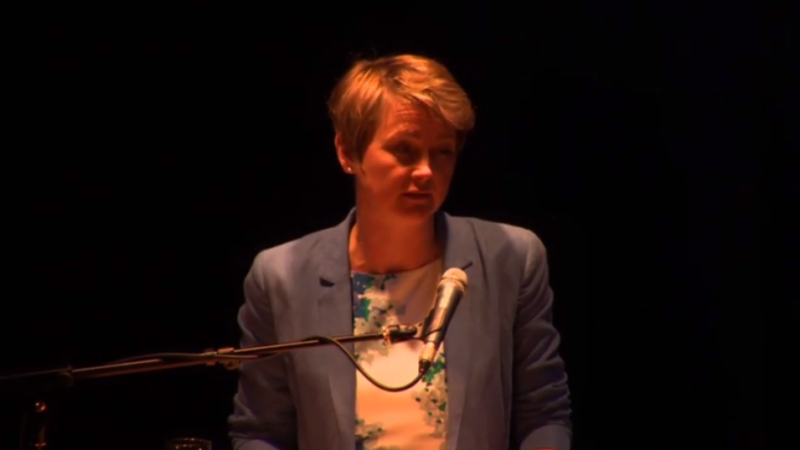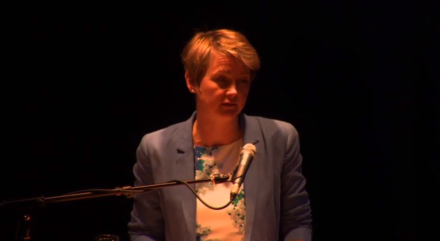
Yvette Cooper will today announce how she would create two million new high-skilled manufacturing jobs.

Cooper is in the running to be Labour’s next leader. Today she will visit the Graphene centre in Manchester where she will say that she would seek to bring the UK in line with countries like Germany, by investing 3% of GDP in manufacturing jobs. She will also say that she’ll increase collective investment in science and Research and Development to 3% of GDP.
As part of her plan to improve R&D Cooper will say she would prioritise these programmes across government to ensure more of the existing funding was opened up for R&D opportunities. She would also build on the R&D tax credit, which some have argued is better targeted in other countries.
In addition to these measures, Cooper will explain that she will set up a Business Advisory Group to guide her as Leader of the Opposition. This group would include businesses that don’t support Labour. The aim would be to create plans about how government and business should work together on developing science and the digital economy.
The leadership hopeful will go on to outline how Labour need long term policy continuity – including funding – for science. She will also make the case for supporting vocational skills, through University Technical Colleges and continuing to innovate in apprenticeships and higher education.
She will argue that this leadership race must “focus on the future challenges for Britain” and not just be an “inward looking debate”.
Cooper will say:
“We are being left behind as a nation. Some regions are being left behind faster than others. Our society is becoming more unfair. There’s more insecurity, and not just those on the lowest incomes but also those on middle incomes.
“As Christine Lagarde argued recently, in too many cases, low middle income households ‘have come to realize that hard work and determination alone may not be enough to keep them afloat’. That’s why rewarding, fulfilling work must be at the heart of all our plans.”
“We should be at the heart of a revolution in research and science investment. That’s why I will set a target of 3% GDP for science and R&D investment. Just imagine what that would mean for our universities, our cities, our companies. That would transform our economy. It would be a down payment on a different future for Britain, for our children and their children after them.
“When Manchester invented the new technologies of the industrial revolution, we turned them into jobs. Now we aren’t. China and the United States have done far more to turn Manchester’s great Graphene invention into patents than we have here at home. And countries that invest more in science also deliver far more high skilled manufacturing jobs
“If we were investing 3pc of our GDP in science that would give us the chance of 2 million more skilled manufacturing jobs for our country.
“Britain can’t compete with Brazil or Indonesia on low-wage, low skill jobs. But with high-skilled jobs in emergent technologies, in the digital revolution, in the shift to a post-carbon economy, in the harnessing of new technologies such as graphene, we can do what we’ve done before: punch well above our weight as a small island off the coast of Europe.
“This should be Labour’s mission. And it is why at the centre of my leadership campaign is the determination to reset the relationship with business – a relationship in real need of a recovery. We will only deliver the jobs and prosperity we need, and also tackle injustice and inequality in future if we have a strong partnership between Government and business and between Labour and business.”
“Our superfast broadband is just not fast enough. In fact many businesses are finding themselves struggling to gain access to what is becoming the life blood of a modern economy. The Government need to be far more ambitious – guaranteeing high-speed broadband for all small businesses. And we need everyone competent and ready to exploit the opportunities that technology and the internet offer.
“We have fought inequality through the centuries of our movement. So as our lives increasingly become networked lives, we must tackle emerging inequality in the digital economy.
“All the while people feel locked out of the online space, or companies feel like they’re in the broadband slow lane, or our brilliant researchers lack sustainable funding, we risk entrenching a new inequality in the new economy. And the digital economy is key to our future prosperity and success as a country. It is therefore vital to sustainable public finances, to good public services and to creating more good jobs. Just as Labour championed the white heat of technology in the 1960s, so today we need to champion the white flashing constellations of the networked world.”




More from LabourList
Almost half of Labour members oppose plans to restrict jury trials, poll finds
‘How Labour can finally fix Britain’s 5G problem’
‘The University of the Air – celebrating 60 years of Harold Wilson and Jennie Lee’s vision’